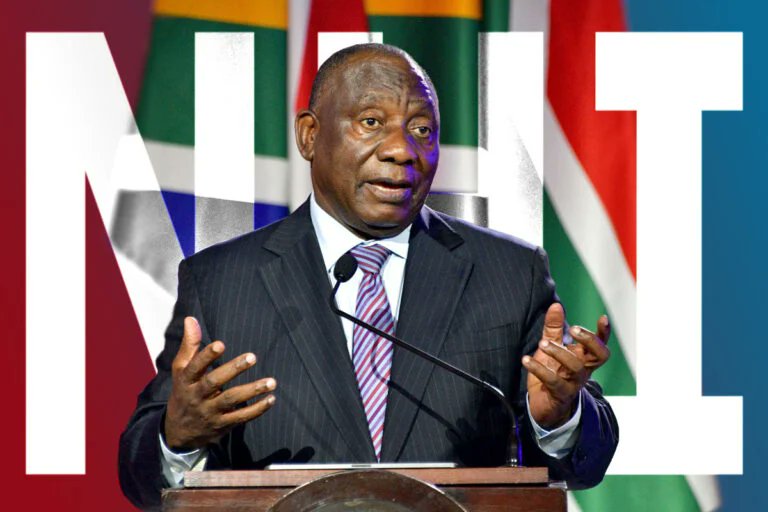News
The Hidden Price of Healthcare: How South Africa’s NHI Could Shrink Your Paycheck

Could a well-intended public health dream become a financial nightmare for South Africa’s middle class?
South Africa’s National Health Insurance (NHI) has long been painted as a bold leap toward equal access to healthcare for all. But for the millions already paying for private medical aid, this leap could come with a painful financial landing: an extra R1,220 out of their wallets each month and that’s just the beginning.
R1,220 Less for You, But No Promise of Better Healthcare
Last month, the Health Funders Association (HFA), which represents schemes covering over 50% of South Africa’s medical aid users, released a sobering report. Commissioned through Genesis Analytics, the economic modelling showed that implementing the NHI in its current form could trigger a 115% increase in personal income tax—shifting the average rate from 21% to a staggering 46%.
If you’re earning on the lower end of the income spectrum, you won’t escape the squeeze either. Taxes for lower-income workers could jump from 18% to 41%. High earners? Try 68% marginal tax rates. And what do you get in return? According to the same analysis, 43% less healthcare than you’re currently receiving under private cover.
“This model offers no guarantee of improved outcomes,” said HFA CEO Thoneshan Naidoo, “while restricting the mechanisms that currently drive quality and innovation in healthcare.”
Losing Medical Aid Credits: The Tipping Point for Families
It’s not just higher taxes, there’s also the matter of scrapping medical scheme tax credits, a financial buffer many families rely on to make private healthcare affordable.
Currently, these credits amount to R1,220 per month, or R14,640 a year—for a typical family of four. Without them, private medical aid would be unaffordable for many, potentially pushing up to 700,000 people onto South Africa’s already overwhelmed public healthcare system.
Craig Comrie, Chair of the HFA and CEO of Profmed, warned that this would disproportionately hurt working-class households. “Over 68% of medical aid users are Black, Indian, or Coloured South Africans, and around 83% earn less than R37,500 per month,” he said. “The idea that private medical aid is only for the elite is outdated and untrue.”
The Bigger Picture: A System on Shaky Ground
Let’s not forget: the current public health system is already under strain, plagued by medicine shortages, crumbling infrastructure, and long queues. The HFA insists that while universal health coverage is the right goal, this version of the NHI is fiscally impossible, operationally unworkable, and potentially unconstitutional.
The organisation is now mounting a legal challenge against key elements of the NHI Act. Not to derail progress, but to demand a plan that is inclusive, affordable, and sustainable.
Comrie highlighted another overlooked fact: medical scheme members already contribute significantly to the public system—through taxes—even if they don’t use it. “The public health budget amounts to R5,000 per person annually, more than double what many receive in tax credits,” he said.
Taxing the Impossible: The Math Doesn’t Add Up
Genesis Analytics explored all potential funding options for the NHI. Even under wildly optimistic scenarios, like slashing private sector costs by 45%, the numbers still don’t balance. One extreme model suggested that VAT would have to jump from 15% to 36% to cover the gap.
Let’s be real: that’s not happening. Not without sending South African households into an economic tailspin.
Public Opinion: Growing Unease Online
Online, the conversation is heating up. On social media, hashtags like #NHIRealityCheck and #ProtectMyMedicalAid have begun trending among South Africans anxious about their financial future. Twitter (now X) is littered with comparisons to failed state-run health systems elsewhere, and Facebook groups for healthcare workers are full of worried professionals contemplating whether to stay in the country.
Healthcare unions have remained cautiously optimistic, supporting the broader goal of universal healthcare, but calling for clearer funding mechanisms and better consultation with the private sector.
Where Do We Go From Here?
Naidoo says the HFA supports an inclusive hybrid model, one that blends public funding with private sector capabilities. “We need reform that works for everyone, not a revolution that breaks what’s already functioning,” he said.
For now, South Africans should watch the upcoming legal proceedings and budget updates closely. The Finance Minister alone holds the power to introduce tax changes, not the NHI Bill itself, but public pressure could make all the difference in shaping what comes next.
In a country already stretched thin, healthcare reform must walk a fine line: balancing justice with reality, and ambition with affordability.
Because for millions of working families, it’s not just about policy, it’s about R1,220 that they simply can’t afford to lose.
{Source: BusinessTech}
Follow Joburg ETC on Facebook, Twitter , TikTok and Instagram
For more News in Johannesburg, visit joburgetc.com



























